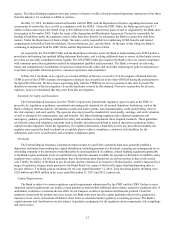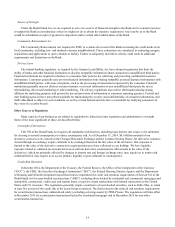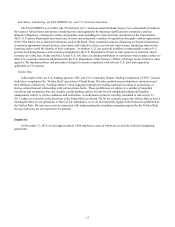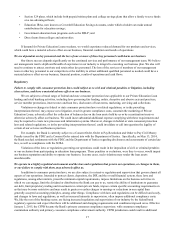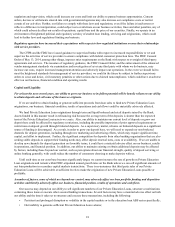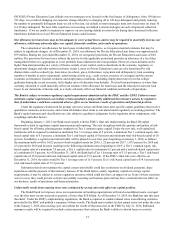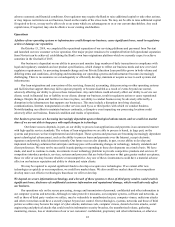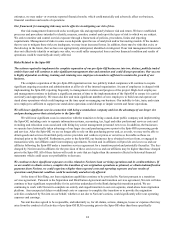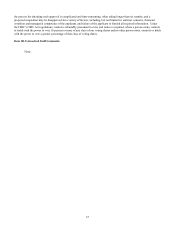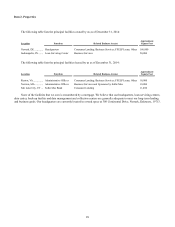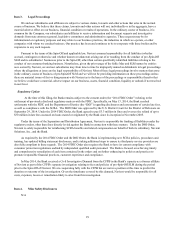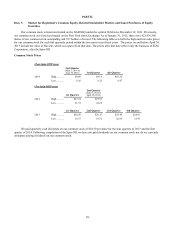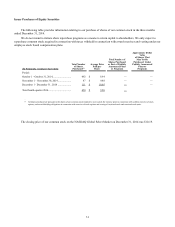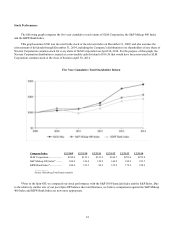Sallie Mae 2014 Annual Report Download - page 24
Download and view the complete annual report
Please find page 24 of the 2014 Sallie Mae annual report below. You can navigate through the pages in the report by either clicking on the pages listed below, or by using the keyword search tool below to find specific information within the annual report.adverse economic and financial conditions. Our regulators may require the Bank to raise additional capital or take other actions,
or may impose restrictions on our business, based on the results of the stress tests. We may not be able to raise additional capital
if required to do so, or may not be able to do so on terms which are advantageous to us or our current shareholders. Any such
capital raises, if required, may also be dilutive to our existing stockholders.
Operations
A failure of our operating systems or infrastructure could disrupt our business, cause significant losses, result in regulatory
action or damage our reputation.
On October 13, 2014, we completed the operational separation of our servicing platforms and personnel from Navient
and launched our new customer service operation. One major project remains to be completed before full operational separation
from Navient can be achieved: establishing the Bank’s own loan originations platform which we currently expect to achieve
sometime in the first half of 2015.
Our business is dependent on our ability to process and monitor large numbers of daily transactions in compliance with
legal and regulatory standards and our product specifications, which change to reflect our business needs and new or revised
regulatory requirements. As processing demands change and our Private Education Loan portfolio grows in both volume and
differing terms and conditions, developing and maintaining our operating systems and infrastructure becomes increasingly
challenging. There is no assurance we can adequately or efficiently develop, maintain or acquire access to such systems and
infrastructure.
Our loan originations and conversions of the servicing, financial, accounting, data processing or other operating systems
and facilities that support them may fail to operate properly or become disabled as a result of events beyond our control,
adversely affecting our ability to process these transactions. Any such failure could adversely affect our ability to service our
clients, result in financial loss or liability to our clients, disrupt our business, result in regulatory action or cause reputational
damage. Despite the plans and facilities we have in place, our ability to conduct business may be adversely affected by a
disruption in the infrastructure that supports our businesses. This may include a disruption involving electrical,
communications, Internet, transportation or other services used by us or third parties with which we conduct business.
Notwithstanding our efforts to maintain business continuity, a disruptive event impacting our processing locations could
adversely affect our business, financial condition and results of operations.
Our business processes are becoming increasingly dependent upon technological advancement, and we could lose market
share if we are not able to keep pace with rapid changes in technology.
Our future success depends, in part, on our ability to process loan applications and payments in an automated manner
with high-quality service standards. The volume of loan originations we are able to process is based, in large part, on the
systems and processes we have implemented and developed. These systems and processes are becoming increasingly dependent
upon technological advancement, such as the ability to process loans and payments over the Internet, accept electronic
signatures and provide initial decisions instantly. Our future success also depends, in part, on our ability to develop and
implement technology solutions that anticipate and keep pace with continuing changes in technology, industry standards and
client preferences. We may not be successful in anticipating or responding to these developments on a timely basis. We have
made, and need to continue to make, investments in our technology platform to provide competitive products and services. If
competitors introduce products, services, systems and processes that are better than ours or that gain greater market acceptance,
those we offer or use may become obsolete or noncompetitive. Any one of these circumstances could have a material adverse
effect on our business reputation and ability to obtain and retain clients.
We may be required to expend significant funds to develop or acquire new technologies. If we cannot offer new
technologies as quickly as our competitors, we could lose market share. We also could lose market share if our competitors
develop more cost effective technologies than those we offer or develop.
We depend on secure information technology, and a breach of those systems or those of third party vendors could result in
significant losses, disclosure of confidential customer information and reputational damage, which would adversely affect
our business.
Our operations rely on the secure processing, storage and transmission of personal, confidential and other information in
our computer systems and networks. Although we take protective measures, our computer systems, software and networks, as
well as those of third party vendors we utilize, may be vulnerable to unauthorized access, computer viruses, malicious attacks
and other events that could have a security impact beyond our control. Our technologies, systems, networks and those of third
parties we utilize may become the target of cyber-attacks, malicious code, computer viruses, denial of service attacks, social
engineering and physical attacks that could result in information security breaches, the unauthorized release, gathering,
monitoring, misuse, loss or destruction of our or our customers’ confidential, proprietary and other information, or otherwise
22


